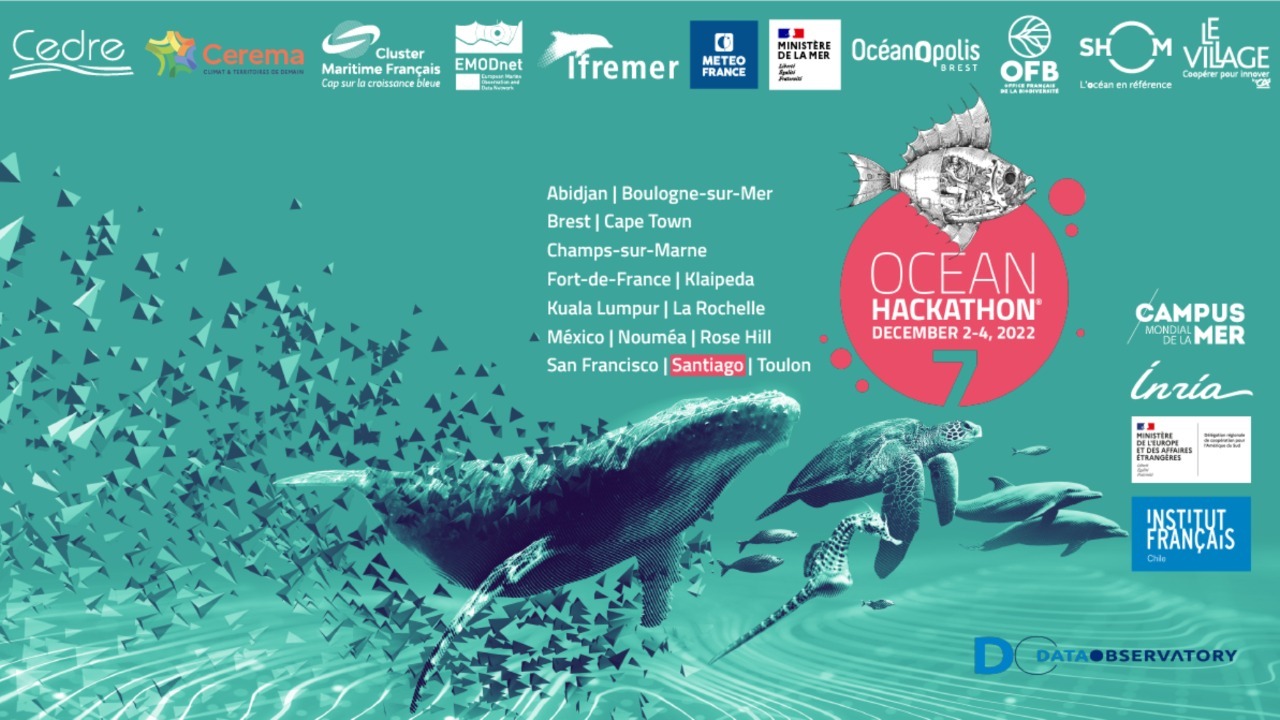
71% of the Earth's surface is covered by water. Chile ranks tenth worldwide in terms of maritime territory, and its 6,430 km of coastline showcases the vastness of the Pacific Ocean. This is one of the reasons why, for the second consecutive year, Chile is taking part in the seventh edition of the Ocean Hackathon (OH), which will be held online from December 2nd to 4th.
The event brings together scientists to tackle a challenge related to ocean biodiversity and the functions of marine ecosystems in just 48 hours. The winners of this edition will have the opportunity to participate in the grand final in Brest, where they will compete against the winners from other participating countries.
OH is organized globally by the Campus Mondial de la Mer, and the Chilean edition is organized by the Regional Cooperation Delegation of the Embassy of France, the French Institute of Chile, and Inria Chile. Just like the 2021 edition, the Data Observatory serves as the data provider for the activity.
Marine biodiversity is vital for primary productivity and the capture of carbon released into the atmosphere by human activities. One of the main drivers of changes in ecosystem functions is biodiversity, which is typically measured by species richness, especially in terrestrial and freshwater environments. Understanding these processes is crucial for taking scientific and political actions.
The Cooperation and Cultural Action Advisor of the Embassy of France in Chile and Director of the French Institute of Chile, Christian Estrade, stated that the Ocean Hackathon "represents an innovative way to address the major challenges of science and society by proposing concrete solutions."
Mauricio Leiva, Project Manager of the Data Observatory, added: "Organizing this type of challenge is truly relevant as it allows us to test in real-time the existing or emerging human capital in Chile, applying data science to current challenges that do not yet have a single answer, such as those associated with climate change and its impact on the marine ecosystem. We hope that this hackathon will give rise to interesting and innovative solutions in the hands of researchers and the younger generations in this field in the country."
2022 Solutions
The solutions in this edition of the Ocean Hackathon -in which thirteen other cities from around the world are participating- involve a comprehensive exploration of the relationship between ecosystem functioning and biodiversity. The goal is to save the oceans through science and innovation, understanding different levels of biodiversity.
Nayat Sánchez-Pi, CEO of Inria Chile, explained that these types of activities aim to "inspire future generations of scientists and engineers who are committed to ecology, the environment, and ocean conservation in many parts of the world. This is an opportunity as the teams are open for more people to join."
This year, solutions have come from different regions of Chile. Representing the Center for Advanced Studies in Arid Zones (CEAZA) from the Coquimbo Region, Dr. Boris Dewitte, a Ph.D. in Oceanography, proposes the solution "Generating and exploring ideas to develop a global database and atlas of oceanic oxygen", this solution aims to create a platform to standardize and synthesize available data on deoxygenation in the Chilean coastal zone and establish a standardized database related to this phenomenon. This solution aligns with the United Nations' program called GOOD, which seeks to combat the growing threat of ocean deoxygenation and its repercussions on marine ecosystems.
Two solutions come from the Biobío Region. The first one is titled "Influence of Climate on Phytoplankton Dynamics at Multiple Scales", presented by Dr. Carlos Lara, Ph.D. in Biology and Applied Ecology. This solution aims to understand and compare the response of phytoplankton biomass to the impact of simultaneous climate fluctuations in the Western Patagonia and the Western Antarctic Peninsula. The goal is to create a digital platform similar to an "environmental traffic light" for maritime prevention.
The second solution is "Conservation of the Hidden Diversity of the Deep Ocean" by Carolina González, a postdoctoral researcher at the University of Concepción and a researcher at the Millennium Oceanography Center. The objective is to generate an interactive database that allows us to understand the specificities of oceanic diversity of the deep sea in the Atacama trench. This solution aims to create a platform that showcases the previously unknown diversity of the deepest area of the South American Pacific and the environmental variables that may be affecting it.
Just like in the 2021 edition, the University of Magallanes, from the Region of Magallanes and Chilean Antarctica, presented a solution called "Towards Addressing Ecological Metadata for Predicting Functional Responses of Marine Biota" through Claudia Andrade, a Ph.D. in Natural Sciences from the same institution. The solution aims to develop a tool that visualizes data, makes future predictions, and is capable of overlaying ecological variables on a map of Patagonia.
Finally, from the Metropolitan Region, Eduardo Guajardo, a PhD. student in Ecology from the Catholic University, presents "Satellite Monitoring of Algal Forests: Efforts for a New Spatiotemporal Scope". This solution aims to develop a time series code of multispectral filters to analyze macroalgae forests, which are recognized as one of the most productive and dynamic ecosystems on Earth, and to understand the changes they have experienced due to climate change.
The call is made to the Chilean innovation ecosystem, researchers, students, and universities to join the teams working on these solutions, to develop them, and to contribute concretely to the protection of the oceans.
If you want to join a team and participate in solving a solution during the Ocean Hackathon 2022, sign up here.
